有关英语语法中《句子成分及五种基本句型》问题_附有习题及答案
英语句子的基本句型和成分(含例题及答案解析)
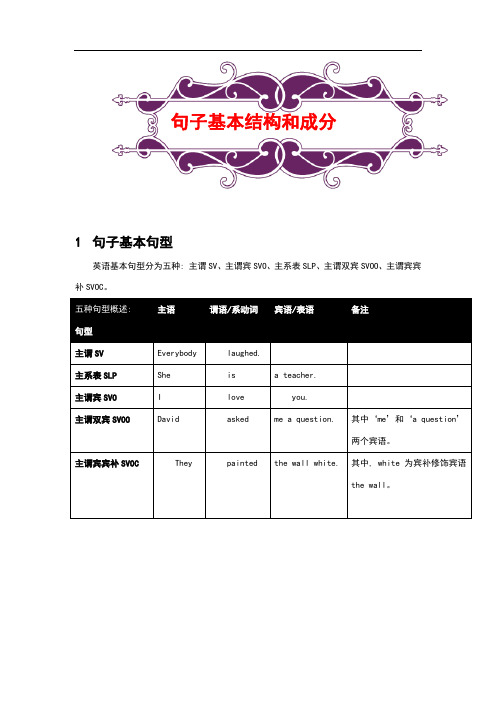
句子基本结构和成分1句子基本句型英语基本句型分为五种: 主谓SV、主谓宾SVO、主系表SLP、主谓双宾SVOO、主谓宾宾补SVOC。
主语谓语/系动词宾语/表语备注五种句型概述:句型主谓SV Everybody laughed.主系表SLP She is a teacher.主谓宾SVO I love you.主谓双宾SVOO David asked me a question.其中‘me’和‘a question’两个宾语。
主谓宾宾补SVOC They painted the wall white.其中, white 为宾补修饰宾语the wall。
1.1主谓句型(Subject Predicate Verb-SV)1.1.1解析1.1.2主谓句型与主谓宾句型最大的区别在于谓语动词的及物与不及物。
英语把及物动词叫做 transitive verb,不及物动词叫做intransitive verb.”transitive”在英语中是传递的意思, 所以, 如果动词表示的动作可以直接传递到某个事物, 则称为及物动词, 反之称为不及物动词。
及物动词与不及物动词又可以称为外动作词和内动作词。
外动作词是动作涉及或(达到)别的事物的动词, 内动作词是动作凝于或止于主体本身的动词。
基本结构 : 主语+不及物动词1.1.3主语1.1.4可以作主语的成分有名词(如boy), 主格代词(如you), 数词, 动词不定式, 动名词等。
主语一般在句首。
注意名词单数形式常和冠词不分家。
1.1.5谓语1.1.6谓语由动词构成, 是英语时态、语态变化的主角, 一般在主语之后, 后接宾语。
但谓语可以是不及物动词(vi.), 没有宾语, 形成主谓结构。
例句分析:(1)The sun is rising. 太阳正在升起。
(2)Tim is sleeping. 蒂姆正在睡觉。
(3)The train is arriving. 火车要到站了。
英语五大基本句型详解及练习(配答案)

2021届高三英语五种简单句〔一〕从英语的句子结构上说,除了修饰名词的定语和修饰动词的状语外,在千变万化的句子中可归纳为五个根本句式,一般地说,某些动词在某一句式中,下面我们把这些句型和常用的动词进行归类,供大家参考。
一、S(主) + Vi (不及物动词) 〔谓〕Time (s) + flies (Vi)两天过去了。
冬天快要来了。
受伤的猫死了。
发生了一宗交通事故。
1)S + Vi + adverbial ( 副词作状语)Birds sing beautifully.他快乐地离开了。
女孩安静地走了进来。
战争和平地结束了。
雨渐渐地停了。
2〕S + Vi + Prep phase (介词短语作状语)He went on holiday.他们会在三点钟到。
那群孩子步行去上学。
3〕S + Vi +Infinitive (不定式作状语)We stopped to have a rest.他起得早是为了读英语。
他希望做医生。
4〕S + Vi +Participle (现在分词作状语)I will go swimming.我们明天一起去钓鱼。
我明天去划船。
昨天他们去逛街。
S〔主〕+ Vt( 及物动词) 〔谓〕+ Object (宾)------- We like English.1)S + Vt + N/ Pron (名词或代词作宾语)I like music. / I like her.他去年教数学。
我们已收到了他们的来信。
2〕S + Vt + Infinitive (不定式作宾语)I want to help him.他爸爸期待拥有一家工厂。
他们假装在看书。
我尝试去解决那个问题。
常用于这个句型的动词有:attempt ,dare ,decide, desire, expect, hope, wish, intend, learn, need, offer, pretend, promise, propose, refuse, want, manage, plan, fail, try, agree等。
英语五大基本句型详解及练习(配答案)

英语五大基本句型详解及练习(配答案)从英语的句子结构上说,除了修饰名词的定语和修饰动词的状语外,在千变万化的句子中可归纳为五个基本句式,一般地说,某些动词在某一句式中,下面我们把这些句型和常用的动词进行归类,供大家参考。
一、S(主) + Vi (不及物动词) (谓)Time (s) + flies (Vi)两天过去了。
冬天快要来了。
受伤的猫死了。
发生了一宗交通事故。
1)S + Vi + adverbial ( 副词作状语)Birds sing beautifully.他高兴地离开了。
女孩安静地走了进来。
战争和平地结束了。
雨渐渐地停了。
2)S + Vi + Prep phase (介词短语作状语)He went on holiday.他们会在三点钟到。
那群孩子步行去上学。
3)S + Vi +Infinitive (不定式作状语)We stopped to have a rest.他起得早是为了读英语。
他希望做医生。
4)S + Vi +Participle (现在分词作状语)I will go swimming.我们明天一起去钓鱼。
我明天去划船。
昨天他们去逛街。
S(主)+ Vt( 及物动词) (谓)+ Object (宾)------- We like English.1)S + Vt + N/ Pron (名词或代词作宾语)I like music. / I like her.他去年教数学。
我们已收到了他们的来信。
2)S + Vt + Infinitive (不定式作宾语)I want to help him.他爸爸期待拥有一家工厂。
他们假装在看书。
我尝试去解决那个问题。
常用于这个句型的动词有:attempt ,dare ,decide, desire, expect, hope, wish, intend, learn, need, offer, pretend, promise, propose, refuse, want, manage, plan, fail, try, agree等。
英语句子成分和练习题及答案
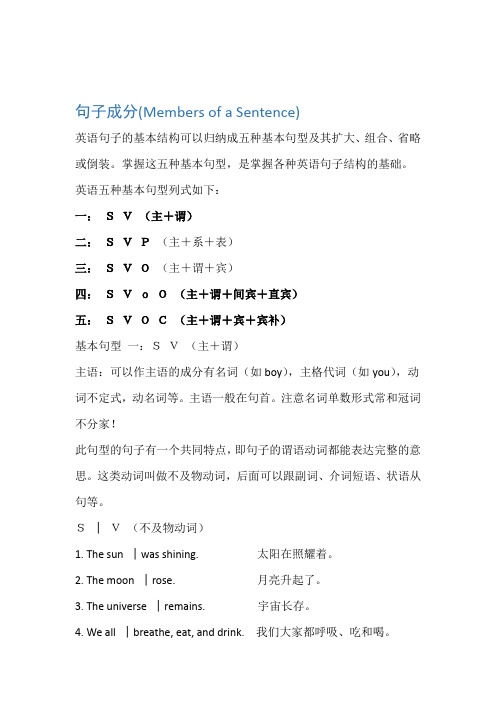
句子成分(Members of a Sentence)英语句子的基本结构可以归纳成五种基本句型及其扩大、组合、省略或倒装。
掌握这五种基本句型,是掌握各种英语句子结构的基础。
英语五种基本句型列式如下:一:SV(主+谓)二:SVP(主+系+表)三:SVO(主+谓+宾)四:SVoO(主+谓+间宾+直宾)五:SVOC(主+谓+宾+宾补)基本句型一:SV(主+谓)主语:可以作主语的成分有名词(如boy),主格代词(如you),动词不定式,动名词等。
主语一般在句首。
注意名词单数形式常和冠词不分家!此句型的句子有一个共同特点,即句子的谓语动词都能表达完整的意思。
这类动词叫做不及物动词,后面可以跟副词、介词短语、状语从句等。
S│V(不及物动词)1. The sun │was shining. 太阳在照耀着。
2. The moon │rose. 月亮升起了。
3. The universe │remains. 宇宙长存。
4. We all │breathe, eat, and drink. 我们大家都呼吸、吃和喝。
5. Who │cares? 管它呢?6. What he said │does not matter. 他所讲的没有什么关系。
7. They │talked for half an hour. 他们谈了半个小时。
1 / 198. The pen │writes smoothly 这支笔书写流利。
基本句型二:SVP(主+系+表)S│V(是系动词)│P1. This │is │an English-Chinese dictionary. 这是本英汉辞典。
2. The dinner │smells │good. 午餐的气味很好。
3. He │fell │in love. 他堕入了情网。
4. Everything │looks │different. 一切看来都不同了。
5. He │is growing │tall and strong. 他长得又高又壮6. The trouble│is │that they are short of money. 麻烦的是他们缺少钱。
语法系列:句子成分及五大基本句式全解+练习(附答案)

简朴句的五种基原句型,并列句战复合句之阳早格格创做W ang Hansong简朴句简析不管瞅上去有多纷繁庞杂的英语句子,删繁便简之后得到的基原框架皆是由五种基原句式拉拢而成.故相识并死知英语简朴句的五种基原句式是明黑所有单复句(单句,并列句,复合句,搀杂句)的最要害的前提包管;它共时也是教佳各大英语语法的必备条件.简朴句的基原句型形成英语句子最要害最基原的组成部分是主语战谓语二大部分.而那二部分需要由分歧功能的词汇性充当,故相识百般词汇性的功能成为主要任务.底下是罕睹几种词汇性的主要功能简介:(记着百般词汇性的英文缩写.)1.名词汇n.:主语,宾语,表语;宾语补脚语2.代词汇pron.; 主语,宾语,表语;(宾语补脚语-已几睹)3.动词汇v.(包罗及物动词汇Vt战不迭物动词汇Vi):谓语,(非谓语-此章节不波及)4 形容词汇adj.:表语,定语,(偶尔也不妨充当状语)-- 常常建饰名词汇或者代词汇5 副词汇adv.:状语(常常建饰动词汇,形容词汇,副词汇;偶尔也建饰介词汇短语)6 连词汇conj.:起到连交二个或者二个以上的句子身分或者句子的功能.7 冠词汇art.:定语,常常建饰名词汇相识并死知罕睹词汇性的主要功能,便不妨为咱们赶快抓住句子的主搞部分及明黑少易句奠定良佳的前提.所以咱们通常正在背单词汇时,务需要明黑并影象其词汇性.有了那个先决条件,再去教习并使用底下的五种基原句式便简朴多了.1. S十Vi 主谓结构2. S十Vt十O主谓宾结构3. S十LinkV十P主系表结构4. S十Vt十O1十O2 主谓单宾结构5. S十Vt十O十OC 主谓宾+宾补结构解读:(1)S=主语;V=谓语;LinkV=系动词汇; P=表语;O=宾语;O1=间交宾语(常常指人);O2=直交宾语(常指物);OC=宾语补脚语)(2)小心瞅察以上五种基原句式,咱们不易创制,各句式中的谓语动词汇类型本去不真足一般.果此也指示咱们正在背单词汇历程中,针对付动词汇要蓄意识的去相识动词汇的类型,辨浑是linkV, Vt仍旧Vi五种基原句式剖析1: S十Vi 主谓结构(Vi常常不交宾语;也无主动语态).此句式后往往会用一些时间,天面,频次,程度,办法等状语建饰,以使句意越收明了.1) 主语时常使用以下词汇性或者词汇形充当: n. / pron./ doing / to do / clause2)用做谓语的罕睹不迭物动词汇(或者短语)有:appear, sit, apologize,arrive, come, go, die,disappear, exist; fall, rise ; occur, happen, take place, come about, break out; come out, comeup, go out等等.Eg:(1) Mr. Black disappeared suddenly.(2) The old nation has existed about one thousand years..(3) Great Changes have taken place in our country since the 1990s .(4) Some good ideas came up at the meeting yesterday.Exx:(Tip:先抽出句子主搞翻译,再正在符合位子加译附加身分)1)咱们班的每一位共教当前教习皆很齐力._____________________________________2)咱们书籍院的大部分班主任常常5:20便起床了._______________________________________3) 那场大火大概是前天下午三面迸收的. _____________________________________2. S十Vt (短语)十O主谓宾结构偶尔句子中含有与宾语有闭的状语.做宾语的身分常是:名词汇、代词汇、动词汇大概式、动名词汇或者从句.如:1) We like sports.咱们喜爱疏通.2) He knows what to do next.他相识下一步搞什么.3) He began learning English ten years ago.十年前他启初教英语.4) I have decided to play the flute well.尔已经决断把少笛吹佳.5) 尔今天与共班共教所有瞅了一部影戏._______________________________.6) You place me in a difficult situation.___________________________.7) They finally managed to get along with us. ____________________________.8)They have _______ _______ ______ of the children.那些孩子他们照瞅得很佳.17)I don’t like being treated like this.________________________________.(注:少量不迭物动词汇后里不妨跟一个相共意思的名词汇做宾语,那样的宾语便喊搞共源宾语.罕睹的能戴共源宾语的动词汇有:lead, live, die, sleep, dream, breathe, smile, laugh, fight, run, sing等.比圆:1). Under the leadership of the Party, the peasants lead a happy life.2). I dreamed a terrible dream last night.3). Our soldiers fought a wonderful fight against the floods last August.4). He died a glorious death.3: S十linkV十P主系表结构1) He is an IT engineer.他是一位疑息工程师.2) The cloth feels smooth.那块布料脚感细滑.3) The river near my house looks more beautiful in the early morning. 尔家附近的那条河正在黄昏瞅上去格中优好.** 那种句型中的系动词汇普遍可分为下列二类:A. 表示状态的结合动词汇.那些词汇有:be, look, seem, appear, smell, feel, taste,sound,keep, remain, 等等.如:4) We should ________ __________ any time. (脆持满真). 5) 那种食物尝起去很糟糕.___________________________________.B. 表示转化或者截止的系动词汇.那些词汇有:become, get, grow, turn, go, come, prove,等等.如:6) Spring comes. It is getting warmer and warmer.7) Don't have the food. _______________________________. (它已经蜕变了).8) The fact__________ ___________. 那个究竟道明是粗确的.4. S十V十O1十O2主谓单宾结构,O1=间交宾语;O2=直交宾语1) The old man gave the little boy some coins.老人给了那个小男孩几个硬币.2) Mr. Hardey teaches US European Literature.哈代先死教咱们欧洲文教.3) His aunt bought him a book and several toys.他婶婶给他购了一原书籍战几个玩具.4) His praise gave US great encouragement.他的褒扬给了咱们很大的饱舞.5) The programmer is showing us how to use the computer.步调员正正在教咱们怎么样使用电脑.(那种句型中做间交宾语的时常指“人”,直交宾语时常指“物”.) 如:6)Yesterday her father __________ ______ _____ _______ as a birthday present. 今天她女亲给她购了一辆自止车动做死日礼物.7) The old man is telling the children stories in theLong March.___________________________________________________.那种句型还可变换为其余二种句型:A.动词汇+直交宾语+for sb.;B.动词汇+直交宾语+to sb..8) Pleaseshow me your picture. = Please ______ _____ __________ _________9) I'll offer you a good chance as long as you don t lose heart.= I'll offer ____ ______ ________ ____ _____ as long as you don't lose heart.5: S十V十O十C主谓宾补结构1) We think Creek too difficult.咱们认为希腊语太易了.2) Wemade him captain.咱们选他做队少.3) They don't want to let us go.他们不念让咱们走.4) When the policemen came in,they found the old man dead.警察进去时创制老人死了.5) He 1ikes to watch the boys playing football. 他喜欢瞅那些男孩们踢脚球.** 那种句型中的“宾语+补语”可统称为“复合宾语”, 做补语的时常是名词汇、形容词汇、副词汇、介词汇短语、分词汇、动词汇大概式等.如:6)Keep________________________________, please. 请让孩子们宁静下去. 7)他把墙漆成红色._____________________________________________________.8)咱们创制他是一个诚真的人.______________________________________________.注意:动词汇have, make, let, see, hear, notice, feel, observe, watch等后里所交的动词汇大概式做宾补时,不戴to.然而如果形成主动语态,则加上to如:9)The boss made him do the work all day.(形成主动语态)____________________________________________________.Exx:推断底下各句分别属于简朴句的哪种基原句型:1. Your sister dances beautifully. ( )2. Doing that would be playing with fire. ( )3. I will tell my friends to protect the environment. ( )4. They kept their marriage a secret. ( )5. She gave me her telephone number. ( )6. Good food keeps you healthy. ( )7. I advise waiting till the right time. ( )8. Did you sleep well? ( )9. Horse-riding and shooting are some of the more unusual events. ( )10. Pop music makes people feel easy and forget about the real world. ( )概括本领锻炼1. Don't smoke in the meeting-room,_________?A. do youB. will youC. can you D.could you2.Canned food do not go ______ easily.A. sourlyB. sourC. souringD. soured3. I shall make your dream _______.A. coming trueB. come true C.to come true D.comes true4. Even in bed his uneasiness about his riches kept him________.A.wake B.awake C.waken D.to awaken5. I think _______ a good habit to get up early.A.this B.it C.that D.its6. -- Do you know Jim quarreled with his brother?—I don’t know,______.A.nor don’t I care B.nor do I careC.I don’t care neither D.I don’t care also7. The television set will keep us _______of the news of the day.A.informed B.entertained C.educated D.inform8. The speaker found himself _______ all alone.A. leaveB. to leave C.1eaving D.1eft9. The day we were longing for _______ at last.A. coming B.came C.to come D.come10. He did all he could ________the poor people in the mountain area.A.help B.to help C.helping D.helped11. Every minute must be made full use of ________our lessons.A.do B.doing C.done D.to do12. The life he has been used to _________disturbed nowA.being B.be C.to be D.is being13. —Would you like to come to dinner tonight.—I'd like to,__ I'm too busy.A. andB. soC. asD. but14. Mrs. Black doesn't believe her son is able to design a digital camera,________?A. is heB. isn't heC. doesn't sheD. does she15. Brian told you that there wasn't anyone in the room at that time, _______?A. was thereB. wasn’t thereC. didn't heD. did he16. ——How about John?——My aunt ______ a good student.A. believes JohnB. suggests JohnC. considers JohnD. knows John17. I like singing __ she likes dancing.A. asB. whileC. whichD. when18. Yesterday was my birthday. My mother ________.A. made for me a cakeB. made a cake to meC. made me a cakeD. made a cake me19. —I hear you got lost yesterday.—Yes, I went to the zoo and couldn't find ______ the hotel.A. my way back toB. how I should go forC. how to returnD. the way back for20. One more week,____ we will accomplish the taskA. orB. so thatC. andD. if21. ——I had thought I would miss the bus.——_________you wouldn't have arrived on time.A. OtherwiseB. SoC. ButD. That22. —Why didn't you buy it?—_______, nor did the color agree with me.A. Because the price was highB. Not only did it fit meC. For I disliked its materialD. Neither was the quality satisfactory23. —Why didn't you go to the airport to see her off?—Oh,__A. no, I did. But I was lateB. yes, I didn't, I'm sorry for it.C. yes, I did. But I couldn't get there on timeD. no, I'm too busy to spare my time, you know24. —The place isn't too bad, is it?—No,_____ it's a bit too crowded.A. butB. forC. andD. as下考查题粗选25. Excuse me for breaking in,_____ I have some for you.A. soB. andC. butD. yet26. The Parkers bought a new house but ______ will need a lot of work before they can move in.A. theyB. itC. oneD. which27. You had one of your teeth pulled out yesterday, _______?A. had youB. hadn't youC. did youD. didn't you28. ______ some of this juice--perhaps you'll like it.A. TryingB. TryC. To tryD. Have tried29. One more week, _________ we will accomplish the task.A. orB. so thatC. andD. if30. —Alice, you feed the bird today, ______?—But I fed it yesterday.A. do youB. will youC. didn't youD. don't you31. Would you like a cup of coffee _____ shall we get down to business right away?A. andB. thenC. orD. otherwise32. She thought I was talking about her daughter, ____, in fact I was talking about my daughter. A. whom B. where C. which D. while33. There is no light in the dormitory. They must have gone to the lecture, _____?A. didn't theyB. don't theyC. mustn't theyD. haven't they34. —I don't like chicken _____ fish.—I don't like chicken,____ I like fishA. and; andB. and; butC. or; andD. or; but35. Be sure to write to us,______?A. will youB. aren't youC. can youD. mustn't you36. ______from Beijing to London!A. How long way it isB. What a long way is itC. How long way is itD. What a long way it is37. Don’t smoke in the meeting-room, ________?A. do youB. will youC. can youD. could you38. Bill’s aim is to inform the viewers that cigarette advertising TV is illegal, ______?A. isn’t itB. is itC. isn’t heD. is he39. There are eight tips in Dr Roger’s lecture on sleep, and one of them is: ______ to bed early unless you think it is necessary.A. doesn’t goB. not to goC. not goingD. don’t go40. ________ straight on and you’ll see a church. You won’t miss it.A. GoB. GoingC. If you goD. When going并列句战复合句句子种类1、按句子的用途可分四种:1)报告句(肯定、可定):He is six years old. / She didn’t hear of you before.2)疑问句(普遍、特殊、采用、反意):-- Do they like skating? / Where did you go yesterday?-- Is he six or seven years old? /Mary can swim, can’t she? / Let’s go, shall we?3)祈使句:Be careful, boys. / Don’t talk in class4)叹息句:What an exciting film it was!/ How clever the boy is!2、按句子的结构可分三种:1)简朴句:惟有一个主语(或者并列主语)战一个谓语(或者并列谓语).如:-- He often reads English in the morning.-- Tom and Mike are American boys.-- She likes drawing and often draws pictures for the wall newspapers.2) 并列句:由并列连词汇(and, but, or等)或者分号(;)把二个或者二个以上的简朴句连正在所有形成.如:-- You help him and he helps you.-- The future is bright; the road is tortuous. 前途是光彩的,门路是直合的.3)复合句:含有一个或者一个以上从句的句子.复合句包罗:名词汇性从句(主语从句、宾语从句、表语从句战共位语从句)、定语从句战状语从句等.并列句的分类1、表示连交二个共等观念,时常使用and, not only…but also…, neither…nor…, then等连交.如:The teacher’s name is Smith, and the student’s name is John.2、表示采用,时常使用的连词汇有or, either… or…, otherwise等.如:Hurry up, or you’ll miss the train.3、表示转合,时常使用的连词汇有but, still, however, yet, while, when等.如:He was a little man with thick glasses, but he had a strange way of making his classes lively and interesting.4、表示果果闭系,时常使用的连词汇有so, for, therefore等.如:August is the time of the year for rice harvest, so every day I work from dawn until dark.复合句复合句也称主从句,即主句战从句,从句须有带领词汇或者喊连词汇引出,可则复合句不可坐.由于连词汇既起连交主句战从句的效率,标明主从句之间的闭系,还正在从句中充当一定的身分,有一定的意思,故复合句中的连词汇常成为考查的中心.从句有三种:1.名词汇性从句(包罗主语从句、宾语从句、表语从句战共位语从句)1)When the train will arrive is unknown.2)Everybody knows that money doesn't grow on trees.3)This is what we should do.4)She told us her hope that she would become a pianist.2.定语从句(形容词汇性从句)He is the man who I saw in the park yesterday.3.状语从句(副词汇性从句)He is absent today, because he is ill.Exercise:推断下列句子是简朴句、并列句仍旧复合句:()1. We often study Chinese history on Friday afternoon.()2. The boy who offered me his seat is called Tom.()3. There is a chair in this room, isn’t there?()4. My brother and I go to school at half past seven in the morning and come back home at seven in the evening.()5. He is in Class One and I am in Class Two.()6. He was fond of drawing when he was yet a child.()7. Neither has he changed his mind, nor will he do so.()8. What he said at the meeting is very important, isn’t it?()9. The farmer is showing the boy how to plant a tree.()10. Both Tom and Jack enjoy country music.下考考面探讨1、简朴句的五大句型是最基原的句型.虽然近几年简朴考查那种前提句型的题已几,然而是正在阅读中偶尔需借帮于区分句子身分去明黑,正在书籍里表黑中,不最基原的遣词汇制句的本领是不可能用天道的英语句子去表黑领会的.2.祈使句、反意疑问句战叹息句是下考命题的热面之一.偶尔把祈使句与反意疑问句分离于一体去考查.一个题目,几个考面,是近几年命题的死少趋势.3、下考对付简朴句、并列句战百般复合句的考查常表示正在对付连词汇的采用战使用上.如:and, but, or, while,以及其余连交名词汇性从句、定语从句战状语从句的连交词汇、闭联词汇.4、百般主从复合句的考查时常与动词汇的时态通联正在所有,以宾语从句与状语从句最为明隐,时间, 让步与条件从句中,如果主句是将去时,从句则用普遍当前式表将去,那一面正在下考中时常考查.We will go outing if it doesn’t rain tomorrow.坚韧锻炼:一、采用挖空:1. Give me one more minute ____ I’ll be able to finish it.A. andB. orC. ifD. so2. It’s the third time that John has been late, __________?A. hasn’t heB. isn’t heC. isn’t itD. hasn’t it3. Let us pass, ___________?A. shan’t weB. shall weC. won’t weD. will you4. I suppose he’s serious, __________?A. do IB. don’t IC. is heD. isn’t he5. I’m sorry to have to say this, ____ you forgot to turn off the lights when you left the room last night.A. andB. butC. soD. because6. John has not yet passed the driving test, and ____.A. Henry hasn’t tooB. Henry also has not eitherC. neither Henry hasD. neither has Henry7. There are many sports lovers in his office. Some love climbing, ____ others enjoy swimming.A. orB. forC. whileD. so8. --- Do you feel like going out ____ would you rather have dinner at home?--- I’d like to go out.A. orB. andC. butD. so9. ---- Your uncle isn’t an engineer, is he?---- ____.A. Yes, he isn’tB. No, he isn’tC. No, he isD. He is10. ____ friendly ____ to everyone!A. How, is sheB. What, is sheC. How, she isD. What, she is11. Mary went to bed early, ____ she felt very tired.A. orB. soC. forD. yet12. As he is strong, ____ can lift one hundred poundsA. yet heB. but heC. heD. and13. ____ down the radio ---- the baby’s asleep in the next room.A. TurningB. TurnC. TurnedD. To turn14. ---- I don’t like chicken ____ fish.---- I don’t like chicken ____ I like fish very much.A. or, butB. and, butC. or, andD. and, and15. -- Would you like to come to dinner tonight? -- I’d like to, ____ I’m too busy.A. andB. soC. asD. but二、用符合的连交词汇挖空:1. He closed the window, turned off the light ________ left the room.2. She is American ________ she speaks Chinese very fluently.3. It is foggy today, ________ we can’t see distant hills.4. He likes sports, ________ I’d rather collect stamps.5. ________ he couldn’t understand was ________ fewer and fewer showed their interest in his lesson.6. I wished we could go sightseeing in Hangzhou this summer and ________we could buy somebooks on our way back in Shanghai.7. She expressed the hope ________ she would write a novel someday.8. The girl ________ English is very good won the first place in the 100-metre race, ________made all of us very happy.9. Please tell us the time ________ we shall have the Chinese exam.10. ________ a young man, he was a storekeeper ________ later a postmaster.三、将下列句子译成英语:1. 他下刻意不再浪费时间战粗力正在搜集游戏上了.(decided not to do)2. 咱们时间很紧,帮手找辆出租车佳吗?(find)3. 有人搞报告常常,咱们得脆持宁静,对付分歧过失?(反义疑问句)4. 咱们把英语瞅做凡是处事中的一种有用的工具.(consider)5. 他们与消了上个星期天去扬州的游览,果为整整下了一天雨.(because)6. 款项便是十足,那个瞅面尔不喜欢.(共位语从句)7. 正在乌暗的大街上,不一个她不妨觅供帮闲的人.(定语从句)8. 他正在那家工厂处事了十年之后便出国了.(after )9. 对付于那些景仰户中活动的人去道,加拿大是最符合居住的场合.(定语从句)10. 纵然惟有少量人赢得乐成,很多人仍旧定居正在那.(although/while)简朴句参照问案:1. Exx:1. S+ Vi.2. S + linkV + P3. S + Vt. + O4. S + Vt. + O + O.C.5. S + Vt. + I.O + D.O6. S + Vt. + O + O.C.7. S + Vt. + O8. S + Vi. 9. S + linkV + P 10. S + Vt. + O + O.C.2. 概括本领锻炼1-5 BBBBB6-10 BADBB 11-15 DDDDC16-20 CBCAC21-24 ADCA25-29 CBDBC30-34 BCDDD35-40 ADBADA并列句、复合句参照问案◆Exercise2:1、简朴句;2、复合句;3、简朴句;4、简朴句;5、并列句;6、复合句;7、并列句;8、复合句;9、简朴句;10、简朴句◆坚韧锻炼:一、1~5 ACDDB 6~10 DCABC 11~15CCBAD二、1. and 2. but 3. so 4. while 5. What; why6. that7. that8. whose, which9. when 10. As, and三、1. He hasdecided not to waste time and energy in computer games.2. We have little time left. Would you please find us a taxi to take.3. we have to keep quietwhen some gives a lecture,, don’t we?4. We consider English (as/to be) a useful tool for everyday work.5. They cancelled their trip to Yangzhou last Sundaybecausse it rained the whole day.6. I don’t like the idea that money is eve rything.7. In the dark street, there wasn’t a single person to whom she could turn for help.8. After he had worked in the factory for ten years, he went abroad.9. For those who love outdoor activities,Canada is a best country in the world to live in.10. Although only a hand of people were successful, many stayed and established settlement in the area.(While only a few people succeeded, many stayed and settled there.)。
(完整word版)初中英语句子成分及五种基本句型讲解与练习()
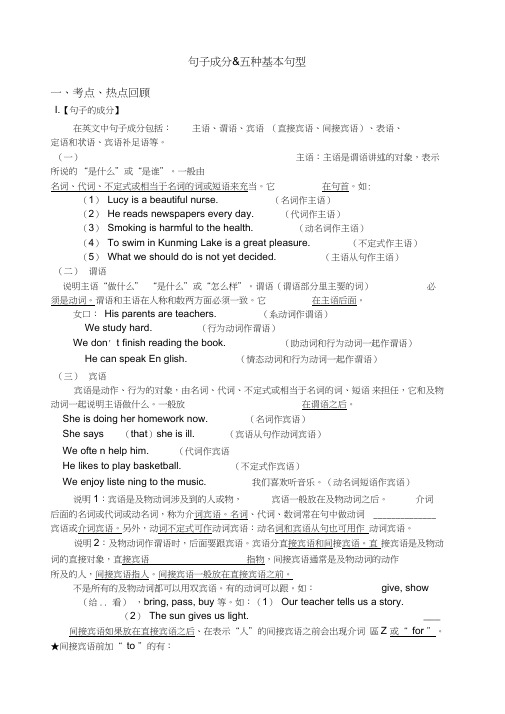
句子成分&五种基本句型一、考点、热点回顾I.【句子的成分】在英文中句子成分包括:主语、谓语、宾语(直接宾语、间接宾语)、表语、定语和状语、宾语补足语等。
(一)主语:主语是谓语讲述的对象,表示所说的“是什么”或“是谁”。
一般由名词、代词、不定式或相当于名词的词或短语来充当。
它在句首。
如:(1)Lucy is a beautiful nurse. (名词作主语)(2)He reads newspapers every day. (代词作主语)(3)Smoking is harmful to the health. (动名词作主语)(4)To swim in Kunming Lake is a great pleasure. (不定式作主语)(5)What we should do is not yet decided. (主语从句作主语)(二)谓语说明主语“做什么” “是什么”或“怎么样”。
谓语(谓语部分里主要的词)必须是动词。
谓语和主语在人称和数两方面必须一致。
它在主语后面。
女口:His parents are teachers. (系动词作谓语)We study hard. (行为动词作谓语)We don' t finish reading the book. (助动词和行为动词一起作谓语)He can speak En glish. (情态动词和行为动词一起作谓语)(三)宾语宾语是动作、行为的对象,由名词、代词、不定式或相当于名词的词、短语来担任,它和及物动词一起说明主语做什么。
一般放在谓语之后。
She is doing her homework now. (名词作宾语)She says (that)she is ill. (宾语从句作动词宾语)We ofte n help him. (代词作宾语He likes to play basketball. (不定式作宾语)We enjoy liste ning to the music. 我们喜欢听音乐。
初中英语句子成分及五种基本句型讲解与练习

初中英语句子成分及五种基本句型讲解与练习句子成分&五种基本句型一、考点、热点回顾I.【句子的成分】在英文中句子成分包括:主语、谓语、宾语(直接宾语、间接宾语)、表语、定语和状语、宾语补足语等。
(一)主语:主语是谓语讲述的对象,表示所说的“是什么”或“是谁”。
一般由名词、代词、不定式或相当于名词的词或短语来充当。
它在句首。
如:(1)Lucy is a beautiful nurse.(名词作主语)(2)He reads XXX.(代词作主语)(3)XXX.(动名词作主语)(4)XXX.(不定式作主语)(5)What we should do is not yet decided.(主语从句作主语)(二)谓语申明主语“做甚么”“是甚么”或“怎样样”。
谓语(谓语局部里首要的词)必需是动词。
谓语和主语在人称和数两方面必需同等。
它在主语背面。
如:His XXX(系动词作谓语)We study hard.(行动动词作谓语)XXX.(助动词和行为动词一起作谓语)XXX.(情态动词和行为动词一起作谓语)(三)宾语宾语是动作、行为的对象,由名词、代词、不定式或相当于名词的词、短语来担任,它和及物动词一起说明主语做什么。
一般放在谓语之后。
She is doing her XXX.(名词作宾语)She says(that)she is XXX.(宾语从句作动词宾语)We often help him.(代词作宾语)XXX.(不定式作宾语)XXX to the music.我们喜爱听音乐。
(动名词短语作宾语)申明1:宾语是及物动词触及到的人或物,宾语普通放在及物动词以后。
介词背面的名词或代词或动名词,称为介词宾语。
名词、代词、数词常在句中做动词宾语或介词宾语。
别的,动词不定式可作动词宾语;动名词和宾语从句也可用作动词宾语。
申明2:及物动词作谓语时,背面要跟宾语。
宾语分间接宾语和间接宾语。
间接宾语是及物动词的间接工具,间接宾语指物,间接宾语平日是及物动词的举措所及的人,间接宾语指人。
英语句子成分讲解(附练习和答案)

宾语 –动作的承受者
• 动宾
– – – – – – – I like China. (名词) He hates you. (代词) How many do you need? We need two. (数词) We should help the old and the poor. I enjoy working with you. (动名词) I hope to see you again. (不定式) Did you write down what he said? (宾语从句)
名词才有同位语; 同位语即名词补足语; 省略同位语,句子意思完整。
‾ My uncle, my mother’s brother, died of cancer when he was 47. ‾ I have no idea when they will be back and settle down.
谓语 –说明主语的动作、状态和特征
必不可少; 决定句子结构; 谓语的形式结构-动词
– We study English. – He likes playing the games.
宾语 –动作的承受者
• 动宾
– – – – – – – I like China. (名词) He hates you. (代词) How many do you need? We need two. (数词) We should help the old and the poor. I enjoy working with you. (动名词) I hope to see you again. (不定式) Did you write down what he said? (宾语从句)
五种基本句型(含练习及答案)

五种基本句型句子是由主语、谓语动词、表语、宾语、宾语补足语等组成的。
英语句子有长有短,有简有繁,似乎千变万化,难以捉摸,但其实只有五种基本句型。
所有英语句子都可以看成是这五种基本句型的扩大、组合、省略或倒装。
因此掌握这五大句型,是掌握其他各种英语句子结构的基础。
英语句子依其组合方式可分为以下五种基本句型,句子成分的表示法为: S:Subject(主语), V:Verb (动词),O:Object(宾语), IO : Indirect Object (间接宾语), DO: Direct Object (直接宾语) , P:Predicative(表语), OC: Object Complement(宾语补足语)。
五种基本句型见下表(S=主,V=谓,O=宾,P=表,IO=间宾,DO=直宾,OC=宾补):种类句型例句第1种S+V We work. (不及物)第2种 S+V+O He plays (及物) the piano.第3种S+V+P We are(系动词) students.第4种 S+V+IO+DO She gave(及物) me a pen.第5种 S+V+O+OC He made(及物) the boy laugh.一、第1种句型:S+V(主语+不及物动词)1、Birds fly. 鸟飞。
主语+谓语 (不及物动词)2、He runs in the park. 他在公园里跑。
主语+谓语+地点状语 (不及物动词)此句型是“主语+不及物动词”构成句子的主体部分。
因为是不及物动词,后面当然不能带宾语了,但是可以有状语来修饰。
例如上面例句中的 in the park就是地点状语。
3、Class begins.(begin在句中是不及物动词)上课了。
比较:We begin our class at eight. 我们八点钟开始上课。
该句则属于第2种句型,begin在句中是及物动词,由此可见有些动词既可作及物动词也可以作不及物动词。
英语句子成分和练习题及答案

句子成分(Members of a Sentence)英语句子的基本结构可以归纳成五种基本句型及其扩大、组合、省略或倒装。
掌握这五种基本句型,是掌握各种英语句子结构的基础。
英语五种基本句型列式如下:一:SV(主+谓)二:SVP(主+系+表)三:SVO(主+谓+宾)四:SVoO(主+谓+间宾+直宾)五:SVOC(主+谓+宾+宾补)基本句型一:SV(主+谓)主语:可以作主语的成分有名词(如boy),主格代词(如you),动词不定式,动名词等。
主语一般在句首。
注意名词单数形式常和冠词不分家!此句型的句子有一个共同特点,即句子的谓语动词都能表达完整的意思。
这类动词叫做不及物动词,后面可以跟副词、介词短语、状语从句等。
S│V(不及物动词)1. The sun │was shining. 太阳在照耀着。
2. The moon │rose.月亮升起了。
3. The universe │remains.宇宙长存。
4. We all │breathe, eat, and drink. 我们大家都呼吸、吃和喝。
5. Who │cares?管它呢?6. What he said │does not matter. 他所讲的没有什么关系。
7. They │talked for half an hour. 他们谈了半个小时。
8. The pen │writes smoothly 这支笔书写流利。
基本句型二:SVP(主+系+表)S│V(是系动词)│P1. This │is│an English-Chinese dictionary. 这是本英汉辞典。
2. The dinner │smells│good.午餐的气味很好。
3. He │fell│in love. 他堕入了情网。
4. Everything │looks│di fferent. 一切看来都不同了。
5. He │is growing │tall and strong. 他长得又高又壮6. The trouble│is│that they are short of money. 麻烦的是他们缺少钱。
完整版)英语句子成分和练习题及答案

完整版)英语句子成分和练习题及答案什么是句子成分?它指的是组成句子的不同成分。
在句子中,不同的词之间有一定的组合关系,这些关系可以将句子分为不同的成分。
句子成分通常由词或词组充当。
现代汉语中,一般有六种句子成分,包括主语、谓语、宾语、定语、状语和补语。
而英语中则有七种基本句子成分,包括主语(subject)、谓语(predicate)、表语(predicative)、宾语(object)、定语(attribute)、状语(adverbial)和补语(complement)。
英语句子的基本结构可以归纳为五种基本句型,通过扩大、组合、省略或倒装可以得到各种不同的英语句子结构。
掌握这五种基本句型是掌握各种英语句子结构的基础。
这五种基本句型分别是:1.SV(主+谓)2.SVP(主+系+表)3.SVO(主+谓+宾)4.SVoO(主+谓+间宾+直宾)5.SVOC(主+谓+宾+宾补)其中,第一种基本句型为SV(主+谓),主语可以是名词(如boy)、主格代词(如you)、动词不定式、动名词等。
主语一般出现在句首,而谓语由动词构成,是英语时态、语态变化的主角,一般在主语之后。
不及物动词(vi.)没有宾语,形成主谓结构,例如"We come."。
这种句型的句子有一个共同特点,即句子的谓语动词都能表达完整的意思。
这类动词叫做不及物动词,后面可以跟副词、介词短语、状语从句等。
例如"The sun was shining."(太阳在照耀着。
)和"They talked for half an hour."(他们谈了半个小时。
)。
第二种基本句型为SVP(主+系+表),主语和谓语之间有一个系动词(如be、e、seem、feel等),它用来连接主语和表语。
表语可以是名词、形容词、副词、介词短语等。
例如"The pen writes smoothly."(这支笔书写流利。
有关英语语法中《句子成分及五种基本句型》问题_附有习题及答案

有关英语语法中《句子成分及五种基本句型》问题_附有习题及答案英语的基本句型主要有五种,它们是:1、主语——动词——表语2、主语——动词3、主语——动词——宾语4、主语——动词——宾语——宾语5、主语——动词——宾语——补语掌握好这些基本句型,就可以为灵活运用语言打下良好的基础。
下面分别讲解这五种句型。
一、主语——动词——表语在这一句型中,动词是系动词,划线部分为表语。
1.Mr.Brown is an engineer.(名词做表语)2.Gradualy he became silent.(形容词做表语)3.She remained standing for a hour.(现在分词做表语)4.The question remained unsolved.(过去分词做表语)5.The machine is out of order.(介词短语做表语)6.The television was on.(副词做表语)7.His plan is to keep the affair secret.(动词不定式做表语)8.My job is repairing cars.(动名词做表语)9.The question is what you want to do.(从句做表语,即:表语从句)注意:在下面的句子中,形容词做表语,在表语的后面常常接不定式结构。
I'm happy to meet you.They are willing to help.We are determined to follow his example.二、主语——动词在这一句型中,动词为不及物动词及不及物的动词词组。
在有的句子中,不及物动词可以有状语修饰。
1.The sun is rising.2.I'll try.3.Did you sleep well?(well做状语,修饰不及物动词sleep)4.The engine broke down.注意:在此句型中,有少数不及物动词表达被动含义,表达主语本身所具有的特性,不用被动语态。
英语句子成分讲解(附练习和答案)

weeds by the roots. (4) the weeds will stay away for a longer time.
主 谓 时间状语
(5) The first solution appeared easy,
主 谓 表/主补
(6) the problem remained.
句子成分
主语、宾语 谓语 补足语
属性
名词性的 动词性的 名词性的或形容词性的
状语
定语
副词性的
形容词性的
5 种基本句型 - 动词决定句型
动词类型
不及物动词 及物动词 系动词 1. 不带宾语 2. 带一个宾语 3. 带两个宾语 4. 带宾语和宾语补足语 5. 带主语补足语 主+谓 主+谓+直宾 主+谓+间宾+直宾 主+谓+直宾+宾补 主+谓(系)+表
宾语补足语. 主语补足语(表语); 补足语的形式结构:
– – – – – – – – – – – – We elected him monitor. (名词) We all think it a pity that she didn’t come here. (名) We will make them happy. (形容词) We found nobody in. ( 副词 ) Please make yourself at home. 介词短语) Don’t let him do that. (省to不定式) His father advised him to teach the lazy boy a lesson. (to不定式) Don’t keep the lights burning. (现在分词) I’ll have my bike repaired. (过去分词) He was elected monitor. She was found singing in the next room. He was advised to teach the lazy boy a lesson.
英语句子成分讲解(附练习和答案)

(10)This attitude leads to disappointment or even failure.
主 谓 宾
主语 – 谓语动作的执行者
主语可以省略。 主语的形式结构:
– – – – – – –
The sun rises in the east. (名词) He likes dancing. (代词) Twenty years is a short time in history. (数词) Seeing is believing. (动名词) To see is to believe. (不定式) What he needs is a book. (主语从句) It is very clear that the elephant is round and tall like a tree.
• •
介词后的名词、代词和动名词-----介宾
– Are you afraid of the snake?
双宾语-----间宾(指人)和直宾(指物)
– He gave me a book yesterday. – Give the poor man some money.
补语 – 补充说明名词的成分,通常出现在主语或宾语后边。
宾语 –动作的承受者
• 动宾
– – – – – – – I like China. (名词) He hates you. (代词) How many do you need? We need two. (数词) We should help the old and the poor. I enjoy working with you. (动名词) I hope to see you again. (不定式) Did you write down what he said? (宾语从句)
五种基本句型(含练习和答案)
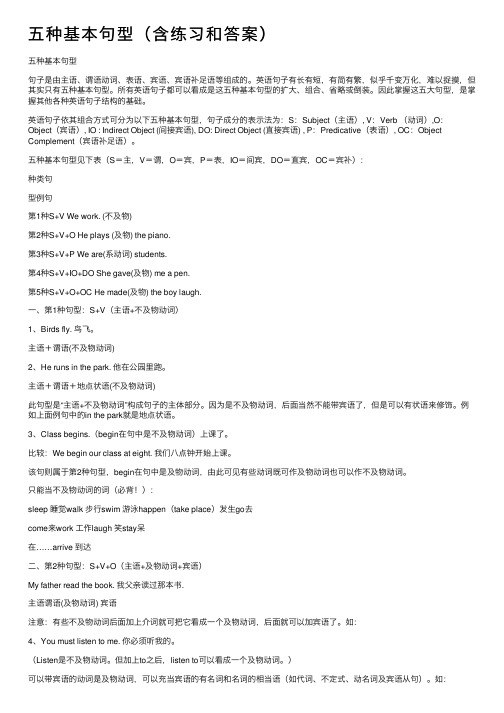
五种基本句型(含练习和答案)五种基本句型句⼦是由主语、谓语动词、表语、宾语、宾语补⾜语等组成的。
英语句⼦有长有短,有简有繁,似乎千变万化,难以捉摸,但其实只有五种基本句型。
所有英语句⼦都可以看成是这五种基本句型的扩⼤、组合、省略或倒装。
因此掌握这五⼤句型,是掌握其他各种英语句⼦结构的基础。
英语句⼦依其组合⽅式可分为以下五种基本句型,句⼦成分的表⽰法为:S:Subject(主语), V:Verb (动词),O:Object(宾语), IO : Indirect Object (间接宾语), DO: Direct Object (直接宾语) , P:Predicative(表语), OC:Object Complement(宾语补⾜语)。
五种基本句型见下表(S=主,V=谓,O=宾,P=表,IO=间宾,DO=直宾,OC=宾补):种类句型例句第1种S+V We work. (不及物)第2种S+V+O He plays (及物) the piano.第3种S+V+P We are(系动词) students.第4种S+V+IO+DO She gave(及物) me a pen.第5种S+V+O+OC He made(及物) the boy laugh.⼀、第1种句型:S+V(主语+不及物动词)1、Birds fly. 鸟飞。
主语+谓语(不及物动词)2、He runs in the park. 他在公园⾥跑。
主语+谓语+地点状语(不及物动词)此句型是“主语+不及物动词”构成句⼦的主体部分。
因为是不及物动词,后⾯当然不能带宾语了,但是可以有状语来修饰。
例如上⾯例句中的in the park就是地点状语。
3、Class begins.(begin在句中是不及物动词)上课了。
⽐较:We begin our class at eight. 我们⼋点钟开始上课。
该句则属于第2种句型,begin在句中是及物动词,由此可见有些动词既可作及物动词也可以作不及物动词。
中考英语五大句型及句子种类专项讲解及练习(附答案)

简单句考试要求:简单句的五种基本句型及There be句型是英语学习的基础和重点,也是中考试卷的重点,在书面表达、句子改写和翻译句子中都经常考查有关句子的知识;感叹句、疑问句、祈使句更是单项选择和句型转换的重点。
1.简单句的句型简单句就是句子只有一个主语和谓语,有五种基本句型:(1)主语+谓语:这种句型称为主谓结构(S+V),其谓语一般是不及物动词。
例如:The rain stopped. 雨停了。
Things have changed now. 现在事情发生了变化。
(2)主语+连系动词+表语:这种句型称为主系表结构(S+L+P),连系动词在形式上也是一种谓语动词,表语一般是名词或者形容词。
例如:His father is a teacher. 他的爸爸是老师。
(表语是名词)Your mother is very young. 你的妈妈很年轻。
(表语是形容词)(3)主语+谓语+宾语:这种句型称为主谓宾结构(S+V+O),其谓语动词是及物动词,宾语一般是直接宾语。
例如:They often speak English at the meeting. 他们在会上经常说英语。
The house caught fire. 房子着火了。
(4)主语+谓语+间接宾语+直接宾语:这种句型称为主谓宾宾结构(S+V+O+O),其谓语动词必须是可以跟双宾语的动词,两个宾语中表示事物的是直接宾语,另一个表示人的是间接宾语。
例如:My father gave me a pen last night. 昨天晚上我爸爸给我一支钢笔。
I will write you a letter when I get there. 我到那里儿时给你写信。
(5) 主语+谓语+宾语+宾语补足语:这种句型称为主谓宾及宾补结构(S+V+O+C)其谓语动词必须是可以跟复合宾语的及物动词。
例如:I find him very clever. 我发现他很聪明。
英语句子的基本句型和成分(含例题及答案解析)

句子基本结构和成分1句子基本句型英语基本句型分为五种:主谓SV、主谓宾SVO、主系表SLP、主谓双宾SVOO、主谓宾宾补SVOC。
五种句型概述:句型主语谓语/系动词宾语/表语备注主谓SV Everybody laughed.主系表SLP She is a teacher.主谓宾SVO I love you.主谓双宾SVOO David asked me a question. 其中‘me’和‘a question’两个宾语。
主谓宾宾补SVOC They painted the wall white. 其中,white 为宾补修饰宾语the wall。
1.1主谓句型(Subject Predicate Verb-SV)1.1.1解析主谓句型与主谓宾句型最大的区别在于谓语动词的及物与不及物。
英语把及物动词叫做 transitive verb,不及物动词叫做intransitive verb.”transitive”在英语中是传递的意思,所以,如果动词表示的动作可以直接传递到某个事物,则称为及物动词,反之称为不及物动词。
及物动词与不及物动词又可以称为外动作词和内动作词。
外动作词是动作涉及或(达到)别的事物的动词,内动作词是动作凝于或止于主体本身的动词。
1.1.2基本结构:主语+不及物动词1.1.3主语可以作主语的成分有名词(如boy),主格代词(如you),数词,动词不定式,动名词等。
主语一般在句首。
注意名词单数形式常和冠词不分家。
1.1.4谓语谓语由动词构成,是英语时态、语态变化的主角,一般在主语之后,后接宾语。
但谓语可以是不及物动词(vi.),没有宾语,形成主谓结构。
1.1.5例句分析:(1)The sun is rising. 太阳正在升起。
(2)Tim is sleeping. 蒂姆正在睡觉。
(3)The train is arriving.火车要到站了。
(4)We waited and waited. 我们等了又等。
初中英语句子成分及五种基本句型讲解与练习
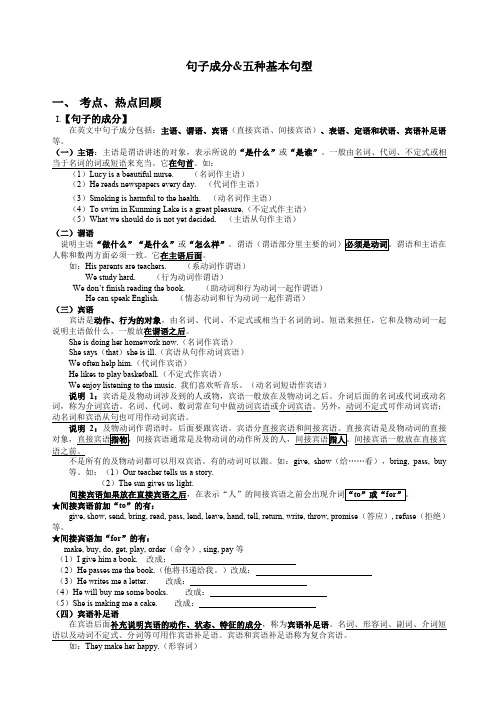
句子成分&五种基本句型一、考点、热点回顾I.【句子的成分】在英文中句子成分包括:主语、谓语、宾语(直接宾语、间接宾语)、表语、定语和状语、宾语补足语等。
(一)主语:主语是谓语讲述的对象,表示所说的“是什么”或“是谁”。
一般由名词、代词、不定式或相当于名词的词或短语来充当。
它在句首。
如:(1)Lucy is a beautiful nurse. (名词作主语)(2)He reads newspapers every day. (代词作主语)(3)Smoking is harmful to the health. (动名词作主语)(4)To swim in Kunming Lake is a great pleasure.(不定式作主语)(5)What we should do is not yet decided. (主语从句作主语)(二)谓语说明主语“做什么”“是什么”或“怎么样”。
谓语(谓语部分里主要的词)必须是动词。
谓语和主语在人称和数两方面必须一致。
它在主语后面。
如:His parents are teachers. (系动词作谓语)We study hard. (行为动词作谓语)We don’t finish reading the book. (助动词和行为动词一起作谓语)He can speak English. (情态动词和行为动词一起作谓语)(三)宾语宾语是动作、行为的对象,由名词、代词、不定式或相当于名词的词、短语来担任,它和及物动词一起说明主语做什么。
一般放在谓语之后。
She is doing her homework now.(名词作宾语)She says(that)she is ill.(宾语从句作动词宾语)We often help him.(代词作宾语)He likes to play basketball.(不定式作宾语)We enjoy listening to the music. 我们喜欢听音乐。
- 1、下载文档前请自行甄别文档内容的完整性,平台不提供额外的编辑、内容补充、找答案等附加服务。
- 2、"仅部分预览"的文档,不可在线预览部分如存在完整性等问题,可反馈申请退款(可完整预览的文档不适用该条件!)。
- 3、如文档侵犯您的权益,请联系客服反馈,我们会尽快为您处理(人工客服工作时间:9:00-18:30)。
英语的基本句型主要有五种,它们是:1、主语——动词——表语2、主语——动词3、主语——动词——宾语4、主语——动词——宾语——宾语5、主语——动词——宾语——补语掌握好这些基本句型,就可以为灵活运用语言打下良好的基础。
下面分别讲解这五种句型。
一、主语——动词——表语在这一句型中,动词是系动词,划线部分为表语。
1.Mr.Brown is an engineer.(名词做表语)2.Gradualy he became silent.(形容词做表语)3.She remained standing for a hour.(现在分词做表语)4.The question remained unsolved.(过去分词做表语)5.The machine is out of order.(介词短语做表语)6.The television was on.(副词做表语)7.His plan is to keep the affair secret.(动词不定式做表语)8.My job is repairing cars.(动名词做表语)9.The question is what you want to do.(从句做表语,即:表语从句)注意:在下面的句子中,形容词做表语,在表语的后面常常接不定式结构。
I'm happy to meet you.They are willing to help.We are determined to follow his example.二、主语——动词在这一句型中,动词为不及物动词及不及物的动词词组。
在有的句子中,不及物动词可以有状语修饰。
1.The sun is rising.2.I'll try.3.Did you sleep well?(well做状语,修饰不及物动词sleep)4.The engine broke down.注意:在此句型中,有少数不及物动词表达被动含义,表达主语本身所具有的特性,不用被动语态。
1.The book sells wel.2.The window won't shut.3.The pen writes smoothly.4.Cheese cuts easily. (接下页三、主语——动词——宾语在此句型中,动词为及物动词,划线部分为宾语。
1.Do you know these people(them)?(名词或代词做宾语)2.I can't express myself in English.(反身代词做宾语)3.He smiled a strange smile.(同源宾语)4.We can't afford to pay such a price.(不定式做宾语)5.Would you mind waiting a few minutes?(动名词做宾语)6.I hope that I have said nothing to pain you.(从句做宾语,即:宾语从句)注意:并不是所有的及物动词都可以接上述各种情况做宾语,不同的动词有不同的用法,所以,在学习动词时,一定要掌握其用法。
四、主语——动词——宾语——宾语在此句型中,动词可以称作双宾语动词,在英语中,这样的动词并不多,在学习遇时,要牢记。
后面的宾语为间接宾语和直接宾语,其中间接宾语在前,一般表人,直接宾语在后,一般表物。
这类句型有三种情况。
第一种情况,间接宾语可以改为to引导的短语。
1.He handed me a letter.He handed a letter to me.2.She gave me her telephone number.She gave her telephone number to me.第二种情况,间接宾语可以改为for引导的短语。
3.She sang us a folk song.She sang a folk for us.4.She cooked us a delicious meal.She cooked a delicious meal for us.第三种情况,直接宾语可以由宾语从句充当。
5.Tell him I'm out.6.Can you inform me where Miss Green lives?五、主语——动词——宾语——宾语补足语在此句型中的动词,叫做可以跟复合宾语的动词,在英语中,这样的动词也不多。
后面的宾语补足语是说明宾语的情况的,宾语和宾语补足语一起被称做复合宾语。
这个句式是英语中比较复杂的一个句式,因为复合宾语的构成内容较多。
下面句子中划线部分为宾语补足语。
1.He found his new job boring.(形容词做宾补)2.The called their daughter Mary.(名词做宾补)3.This placed her in a very difficult position.(介词短语做宾补)4.We went to here house but found her out.(副词做宾补)5.What do you advise me to do?(不定式做宾补)6.We thought him to be an honest man.(tobe做宾补)7.He believed them to have discussed the problem.(不定式的完成式做宾补)8.He believed her to be telling the truth.(不定式的进行式做宾补)9.Did you notice him come in?(不带to的不定式做宾补)10.I saw her chatting with Nancy.(现在分词做宾补)11.He watched the piano carried upstairs.(过去分词做宾补)注意:在这个结构中,可以出现用it做形式上的宾语,把真正的宾语放在宾语补足语的后面。
在此结构中,宾语常常是动词不定式或宾语从句。
1.He felt it his duty to mention this to her.分析:it是形式宾语,hisduty是宾语补足语,to mention this to her是真正的宾语。
2.I think it best that you should stay with us.分析:it是形式宾语,best是宾语补足语,that you should stay with us是真正的宾语。
(接下页)注意:1.习惯用语的使用在英语中,有很多动词习惯用语,在学习的过程中,要注意它们的使用,不必分析单独每个词的使用。
例:We are short of money.(be short of中short做表语)She is always making trouble for her friends.(trouble做make的宾语)He has carried out our instructions to the letter.(our instructions做词组carry out的宾语)We are waiting for the rain to stop.(wait for后面的the rain是宾语,to stop是宾语补足语)2.在英语中,大多数动词既可以做及物动词又可以做不及物动词,而且还会有一些固定词组,因此一个动词可以用于几种句型。
例:ask①Did you ask the price?(直接接名词做宾语)②She asked them their names.(接双宾语)③I asked James to buy some bread.(接宾语加不定式做宾语补足语)④I asked to speak to Fred.(接不定式做宾语)⑤Didn't you ask him in?(在此句中和副词in连用)⑥He has asked for an interview with the President.(组成固定词组ask for)3.There be句型是一种特殊的句子,真正的主语在后面,含义为“有…”①谓语动词和主语保持一致:There is a television in the sitting room.②有两个或更多的主语时,动词一般和最近的一个保持一致:There are two girls and a boy dancing in the hall.③主语的后面有时有修饰语:There are a lot of difficulties facing us.There were many things to be done(此处也可以使用to do).④谓语动词be可以有时态的变化:There will be a concert in the park tonight.There was little change in him.⑤谓语也可以有不定式构成的复合谓语。
There used to be a cinema here.There seems to be something the matter with her.Is there going to be any activity tonight?⑥there be句式变疑问句,把be提前;变翻译疑问句也要借助there。
Is there any hope of getting the job?There is nothing wrong with your watch,is there?⑦there be句型中也可以使用诸如:live,follow,come,stand,sit,exist等不及物动词:Once upon a time,there lived a fisherman on the island.There came a knock at the door.At the top of the hill there stands an old temple.⑧用于非谓语的情况下,有时用不定式的复合结构there to be或动名词的复合结构和独立主格结构there being:You wouldn't want there to be another war.(不定式的复合结构)The teacher was satisfied with there being no mistakes in his homework.(动名词的复合结构) There being nothing else to do,we went home.(独立主格结构)■巩固性练习请判断下列句子的结构类型1.He is running.2.The loud voice from the upstairs made him angry.3.The little boy is asking the teacher all kinds of questions.4.She seemed angry.5.My father bought me a beautiful present.6.Why do you keep your eyes closed?7.Will you tell us an exciting story?8.We must keep our classroom tidy and clean.9.I heard the baby crying in the sitting room.10.Can you push the window open?答案:1.主语---动词2.主语---动词---宾语---补语3.主语---动词---宾语---宾语4.主语---动词----表语5.主语---动词---宾语---宾语6.主语---动词---宾语---宾语7.主语---动词---宾语---补语8.主语---动词---宾语---补语9.主语---动词---宾语---补语10.主语---动词---宾语---补语(编辑:赵露)句子成分篇一、词类、句子成分和构词法:1、词类:英语词类分十种:名词、形容词、代词、数词、冠词、动词、副词、介词、连词、感叹词。
